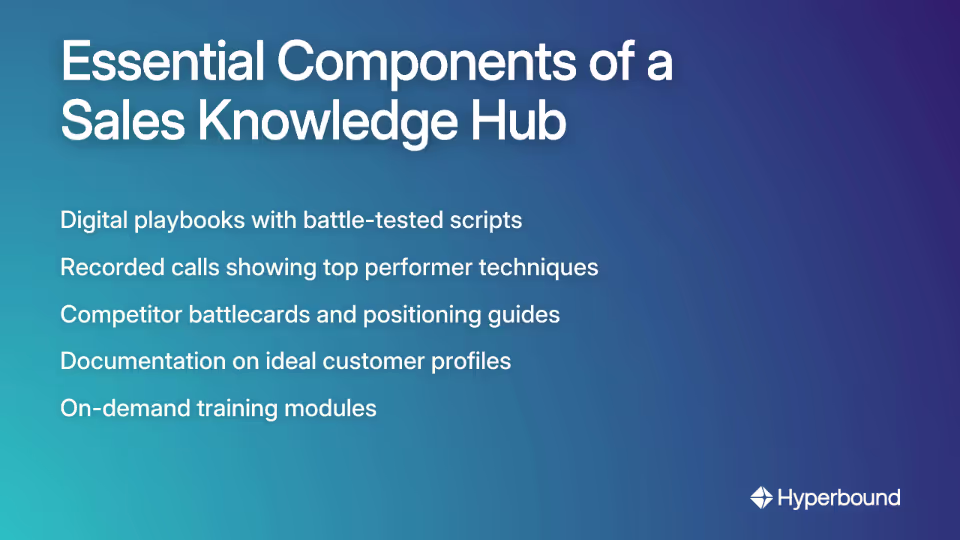
You've just landed your dream sales role. Excitement, ambition, and a touch of nervousness fill your mind as you prepare for day one. Then reality hits: a hastily assembled list of tasks with no instructions, convoluted software systems with zero training, and the sinking realization that you're completely on your own.
"90 days into my 1st Sales job and I haven't had any real or formal training. Day 1 consisted of a list of things to do with no instructions on where or how to get the info being requested," laments one sales professional on Reddit.
Meanwhile, another fortunate rep shares a drastically different experience: "Mine does! I had 7 (!!!!) weeks of onboarding and training. My company takes a ton of pride in its training."
This stark contrast reveals an uncomfortable truth in the sales world: quality onboarding is far from universal, despite its proven impact on performance, retention, and revenue.
The Business Case for Exceptional Sales Onboarding

Before diving into what great onboarding looks like, let's understand why it matters through hard numbers:
- Companies with effective sales onboarding report 73% higher quota attainment rates among new hires
- Well-structured onboarding helps reps achieve quota 50% faster
- Organizations see a 15% revenue boost per rep with proper training
- Effective onboarding increases three-year employee retention by 58%
- Great programs help new hires become productive 3.4 months sooner
The message is clear: comprehensive sales onboarding isn't a nice-to-have luxury—it's a strategic investment with measurable ROI.
As one sales veteran on Reddit bluntly advises: "If any young people are reading this, bail ASAP if you don't receive sales training, don't even stay for a single month."
The Blueprint: What World-Class Sales Onboarding Looks Like
Let's examine the core components that separate exceptional onboarding programs from the "half-hearted product training" many companies offer.
1. A Structured 30-60-90 Day Framework
Exceptional onboarding isn't a one-week information dump; it's a carefully phased journey that gradually builds competence and confidence. Here's what this framework typically includes:
Days 1-30: Building the Foundation
- Week 1: Immersion into company culture, mission, values, and overall sales philosophy
- Weeks 2-4: Comprehensive product training that goes beyond features to address the "why" questions: What market gap does our solution fill? How does it solve customer problems? Why is our approach superior?
- Introduction to your tech stack and initial CRM exposure
- Shadowing top-performing reps on calls to witness theory in action
Days 31-60: Practical Application & Skill Building
- Hands-on CRM training: Master the tools you'll use daily instead of struggling with "convoluted" software
- Sales methodology training: Formal instruction in your company's chosen approach (e.g., Sandler Sales training or Dale Carnegie Sales Advantage)
- Focus on overcoming objections through role-playing and simulation exercises. Modern teams leverage platforms like Hyperbound's AI Sales Roleplays to let reps practice these critical conversations in a safe, repeatable environment.
- For those in an SDR program, mastering lead qualification and beginning outbound prospecting
- Creating your first 1 year sales forecast with manager guidance
Days 61-90: Driving Independence & Measured Performance
- Transition from shadowing to having a dedicated sales coach observe your calls
- Assuming ownership of your quota with clear expectations
- Structured performance reviews to identify strengths and areas for continued development
- Graduation from "new hire" status to fully-ramped team member
2. The Power of Structured Mentorship
No rep should feel like they're on an island. Elite onboarding programs leverage two types of guidance:
The Buddy System
- Pairing with a peer-level colleague who's been where you are
- A safe space to ask "dumb" questions without judgment
- Day-to-day assistance with systems, processes, and company culture
- Typically not your manager, creating psychological safety
Formal Sales Coaching
- Dedicated time with an experienced sales coach who provides structured guidance
- Regular call reviews with actionable feedback. Tools like Hyperbound's AI Real Call Scoring can automate this process, providing objective, data-driven feedback on both practice and real customer calls.
- Assistance identifying patterns in your approach that need refinement
- Support in developing your unique selling style within the company framework
As one sales rep who experienced great onboarding shared, "My company takes a ton of pride in its training. I had an entire week of just learning the company and the product. Then two weeks where I shadowed other reps. Then four weeks where I was running my own calls with someone else on the line to help if needed."
3. Formalized Methodology Training
Product knowledge is necessary but insufficient. Elite programs invest in formal sales methodology training that gives reps a repeatable framework for every stage of the sales process.
This might include:
- Sandler Sales training to master a consultative, needs-based approach
- Dale Carnegie Sales Advantage for relationship-building and influence techniques
- SPIN Selling for effective questioning strategies
- Challenger Sale for insight-driven customer conversations
Unlike the rep who lamented, "I hated my job, A LOT because I was not given any sales training until I learned everything myself from books," properly onboarded reps receive structured guidance in proven methodologies.

4. A Centralized Knowledge Hub

Effective onboarding programs provide new hires with a single source of truth containing:
- Digital playbooks with battle-tested scripts and email templates
- Recorded calls showcasing how top performers handle common scenarios. AI platforms like Hyperbound can analyze these conversations at scale to surface the winning talk tracks and behaviors that power your playbooks.
- Competitor battlecards and positioning guides
- Clear documentation on ideal customer profiles and buyer personas
- On-demand training modules for self-paced reinforcement
5. Measuring Success and Continuous Improvement
Great onboarding isn't static—it evolves based on feedback and performance data. The best programs track:
- Time to first deal
- Ramp-up time compared to benchmarks
- First-quarter quota attainment rates
- New hire retention at 3, 6, and 12 months
- Satisfaction scores from onboarding participants
Leveraging an AI Coaching platform provides a centralized dashboard to track these metrics, correlating training activities with performance outcomes to continuously refine the onboarding process.
Beyond Onboarding: The Ongoing Development Journey
While this article focuses on initial onboarding, elite sales organizations recognize that development never truly ends. The best companies provide:
- Ongoing coaching beyond the initial 90 days
- Advanced sales methodology training as reps mature
- Regular opportunities to close market gap knowledge through continued education
- Career path visibility and development planning
The Bottom Line: What You Should Demand (or Build)
Whether you're evaluating a potential employer or designing your team's onboarding program, recognize that proper sales training isn't a luxury—it's an essential investment with clear ROI.
As a sales professional, you deserve more than being thrown into the deep end with a list of tasks and no guidance. As a sales leader, your organization deserves the competitive advantage that comes from properly developing your talent.
The stark difference between "I almost want to cry finding all this out. I can't believe I have been put through such hell" and "I had 7 weeks of onboarding and training" isn't just about employee satisfaction—it's about building a sustainable, high-performing sales organization that consistently meets and exceeds its targets.
Demand better. Build better. The future of your sales career or organization depends on it.
Frequently Asked Questions
What is sales onboarding and why is it crucial?
Sales onboarding is a structured process designed to integrate new sales representatives into a company, equipping them with the knowledge, skills, and tools needed for success. It is crucial because effective onboarding directly impacts performance, retention, and revenue, leading to higher quota attainment, faster ramp-up times, and a significant boost in long-term employee retention.
How long should a typical sales onboarding process last?
A comprehensive sales onboarding process typically lasts for 90 days. This duration is often structured as a 30-60-90 day plan, allowing new hires to gradually build their skills and confidence. The first 30 days focus on foundational knowledge, the next 30 days on practical application and skill-building, and the final 30 days on driving independence and performance.
What are the essential elements of a world-class sales onboarding program?
The key elements of a world-class sales onboarding program include a structured 30-60-90 day framework, a mentorship system with both a peer "buddy" and a formal sales coach, formalized sales methodology training (like Sandler or Dale Carnegie), a centralized knowledge hub with playbooks and call recordings, and clear metrics to measure success and drive continuous improvement.
What is a 30-60-90 day plan in sales onboarding?
A 30-60-90 day plan is a phased roadmap that outlines specific goals, training activities, and performance expectations for a new sales representative's first three months. The goal is to provide a structured journey from foundational learning (Days 1-30) to practical application (Days 31-60) and finally to independent performance (Days 61-90), ensuring a smooth and effective transition into the role.
What should I do if my company provides little to no sales training?
If your company offers poor or nonexistent sales training, you should first try to be proactive by seeking out resources independently, such as books, online courses, and industry podcasts. Find an informal mentor within the company and ask to shadow top performers. However, a lack of investment in training can be a major red flag, so you should also evaluate if the company is a good long-term fit for your career growth.
How can a company measure the ROI of its sales onboarding?
A company can measure the return on investment (ROI) of its sales onboarding by tracking key performance indicators (KPIs). These include metrics like the time it takes for a new hire to make their first sale, the time to full productivity (ramp time), first-quarter quota attainment rates, and new hire retention rates at 3, 6, and 12-month intervals. Comparing these metrics before and after implementing or improving an onboarding program clearly demonstrates its value.

Book a demo with Hyperbound
.png)













